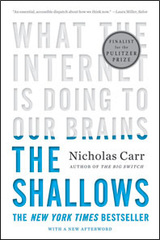
This post was migrated from the no-longer-existent Brandonsoft developer blog and was originally written on May 22, 2012.
It is not often that I post reviews of things that I enjoyed, or didn’t enjoy. It is also seldom that I post reviews about books, novels, or fictional tales, all of which may be collapsed into the former category. Reading has been an enjoyable pastime to me as of late, and I have learned many things from it. One of which being how to write in an eloquent yet simple fashion. The crafting of words has always appealed to me in a way that Legos appear to a young child, and with that being said, I shall begin my review.
The Shallows: What The Internet Is Doing To Our Brains is a novel packed with information about how the human brain works, and what our modern information-based society changes about our every day lives. Nicholas Carr writes about this in a very personalized style, making the book both easy and fun to read. I have to admit, I was a little worried when I picked up this book due to the fact that I have no knowledge of advanced neuroscience whatsoever, and I thought that my lack of knowledge would make Carr’s arguments incomprehensible. However, that clearly was not the case. Nicholas Carr explains everything from basic ideas to advanced theories using brilliant everyday examples, allowing the reader to truly get a sense of what he is talking about. I felt like I was following Carr’s logic every step of the way.
There are also carefully placed personal digressions, where Carr takes the reader away from the argument or history lesson at hand and explains his own personal thoughts on the topic. I have to praise Carr for this, because admittedly, the personal examples he uses in the digressions would have done his central argument no good if they were placed within the text itself, but they add the perfect amount of spice when given their own personal sections. Not only do they allow the reader a break from the argument, but they allow the reader to know Carr, to feel his feelings, to take a quick walk in his shoes. This, I felt, strongly attached me to the author and helped push his argument along.
As far as the content of the book goes, I was a little dismayed by how off topic some chapters seemed to be. For instance, there is a section in the book in which the reader is led down a windy path concerned with the arguments and counter-arguments about the effects of search engines on the brain, when suddenly, the reader reaches a quick and sudden end to the path. This end: a history lesson on how Larry Page revolutionized the Internet world by creating Google. In my opinion, this was extremely out of place. There are several other examples of this style of seemingly unintended paths throughout the book.
Despite this, Carr’s central argument is convincing, and I felt myself agreeing with him and his thoughts on topics with almost everything he said. This may be due to the fact that we are both on the computer a lot, but it may also be contributed to the fact that Carr simply knows how to write and make a point. Whatever the reason, it simply works. The counter-arguments and Carr’s concessions almost seem invisible throughout the work, however, and this weakens his argument. Although there was a discussion of how Aristotle did not believe in using pen and paper, Carr did not seem to address the arguments of those believing that constant computer use does not change our way of thought. This may be because those arguments are either weak or nonexistent, but they should have been addressed nonetheless.
Overall, Nicholas Carr’s work was both enjoyable to read and intriguing. Although it makes me think twice about getting onto the computer each day, I do not regret reading it. If you are an everyday computer user like myself, I suggest picking up this book.
Nicholas Carr’s The Shallows: http://www.theshallowsbook.com/nicholascarr/Nicholas_Carrs_The_Shallows.html
Nicholas Carr’s The Shallows on Amazon: http://www.amazon.com/The-Shallows-Internet-Doing-Brains/dp/0393072223
